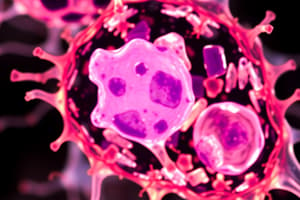Podcast
Questions and Answers
What is a key characteristic of prokaryotic cells?
What is a key characteristic of prokaryotic cells?
- They have membrane-bound organelles.
- They are primarily found in multicellular organisms.
- They possess a nucleus.
- They lack a nucleus and membrane-bound organelles. (correct)
Which organelle is responsible for energy production in the cell?
Which organelle is responsible for energy production in the cell?
- Golgi Apparatus
- Lysosomes
- Endoplasmic Reticulum
- Mitochondria (correct)
What type of cell division results in identical daughter cells?
What type of cell division results in identical daughter cells?
- Meiosis
- Binary fission
- Budding
- Mitosis (correct)
Which part of the cell contains genetic material?
Which part of the cell contains genetic material?
What is the primary function of ribosomes in a cell?
What is the primary function of ribosomes in a cell?
What does the term 'cell metabolism' encompass?
What does the term 'cell metabolism' encompass?
Which phase is not part of mitosis?
Which phase is not part of mitosis?
Which of the following statements concerning eukaryotic cells is true?
Which of the following statements concerning eukaryotic cells is true?
Flashcards are hidden until you start studying
Study Notes
Cell Biology
-
Definition
- Study of the structure, function, and behavior of cells.
-
Cell Theory
- All living organisms are composed of cells.
- The cell is the basic unit of life.
- All cells arise from pre-existing cells.
-
Types of Cells
- Prokaryotic Cells
- Lack a nucleus and membrane-bound organelles.
- Primarily bacteria and archaea.
- Eukaryotic Cells
- Have a nucleus and organelles.
- Include animal, plant, fungal, and protist cells.
- Prokaryotic Cells
-
Cell Structure
- Cell Membrane
- Semi-permeable barrier regulating entry and exit of substances.
- Cytoplasm
- Gel-like fluid that contains organelles.
- Nucleus
- Contains genetic material (DNA) and controls cellular activities.
- Organelles
- Mitochondria: Energy production (ATP).
- Ribosomes: Protein synthesis.
- Endoplasmic Reticulum (ER):
- Rough ER (with ribosomes): Protein modification.
- Smooth ER: Lipid synthesis and detoxification.
- Golgi Apparatus: Modifies, sorts, and packages proteins.
- Lysosomes: Digestive organelles containing enzymes.
- Chloroplasts (in plant cells): Photosynthesis.
- Centrioles: Involved in cell division.
- Cell Membrane
-
Cell Division
- Mitosis
- Process of cell division resulting in two identical daughter cells.
- Stages: Prophase, Metaphase, Anaphase, Telophase.
- Meiosis
- Specialized cell division producing gametes (sperm and eggs).
- Reduces chromosome number by half (haploid).
- Mitosis
-
Cell Communication
- Cells communicate through chemical signals (hormones, neurotransmitters).
- Receptor proteins on cell surfaces receive and transmit signals.
-
Cell Metabolism
- Sum of all biochemical reactions within a cell.
- Anabolism: Building molecules (energy-consuming).
- Catabolism: Breaking down molecules (energy-releasing).
-
Cellular Respiration
- Process by which cells convert glucose and oxygen into energy (ATP), carbon dioxide, and water.
- Stages: Glycolysis, Krebs Cycle, Electron Transport Chain.
-
Stem Cells
- Undifferentiated cells with the potential to develop into various cell types.
- Types: Embryonic stem cells (pluripotent) and adult stem cells (multipotent).
-
Disease and Cells
- Abnormal cell division can lead to cancer.
- Genetic mutations can impact cell function and lead to diseases.
-
Techniques in Cell Biology
- Microscopy (light, electron).
- Cell culture techniques for studying cell behavior and function.
- Genetic engineering and CRISPR for manipulating genes.
Cell Biology
- Study focuses on the structure, function, and behavior of cells.
Cell Theory
- All living organisms consist of cells.
- Cells are the basic unit of life.
- New cells arise from pre-existing cells.
Types of Cells
-
Prokaryotic Cells
- No nucleus or membrane-bound organelles.
- Mainly consist of bacteria and archaea.
-
Eukaryotic Cells
- Contain a nucleus and organized organelles.
- Include animal, plant, fungal, and protist cells.
Cell Structure
-
Cell Membrane
- Semi-permeable barrier controlling substance entry and exit.
-
Cytoplasm
- Gel-like fluid within cells that houses organelles.
-
Nucleus
- Houses genetic material (DNA) and regulates cellular functions.
-
Organelles
- Mitochondria: Site of ATP (energy) production.
- Ribosomes: Responsible for protein synthesis.
- Endoplasmic Reticulum (ER):
- Rough ER (with ribosomes): Modifies proteins.
- Smooth ER: Engaged in lipid synthesis and detoxification.
- Golgi Apparatus: Modifies, sorts, and packages proteins for transport.
- Lysosomes: Digestive organelles containing enzymes for breaking down waste.
- Chloroplasts (plant cells): Site of photosynthesis.
- Centrioles: Play a role in cell division.
Cell Division
-
Mitosis
- Process producing two identical daughter cells.
- Involves phases: Prophase, Metaphase, Anaphase, Telophase.
-
Meiosis
- Specialized division producing gametes (sperm and eggs).
- Reduces chromosome number by half, resulting in haploid cells.
Cell Communication
- Cells use chemical signals (hormones, neurotransmitters) to communicate.
- Receptor proteins on cell surfaces detect and transmit signals.
Cell Metabolism
-
Represents the totality of biochemical reactions in a cell.
-
Anabolism
- Builds complex molecules, requires energy.
-
Catabolism
- Breaks down molecules, releases energy.
Cellular Respiration
- Converts glucose and oxygen into ATP, carbon dioxide, and water.
- Involves stages: Glycolysis, Krebs Cycle, Electron Transport Chain.
Stem Cells
- Undifferentiated cells capable of evolving into various cell types.
- Types include:
- Embryonic stem cells: Pluripotent, can form any cell type.
- Adult stem cells: Multipotent, limited to specific cell types.
Disease and Cells
- Abnormal cell division can lead to cancer.
- Genetic mutations can disrupt cell functions and lead to various diseases.
Techniques in Cell Biology
- Utilizes microscopy (light and electron) for visualizing cells.
- Employs cell culture methods to study cell behavior.
- Incorporates genetic engineering techniques, including CRISPR, for gene manipulation.
Studying That Suits You
Use AI to generate personalized quizzes and flashcards to suit your learning preferences.




